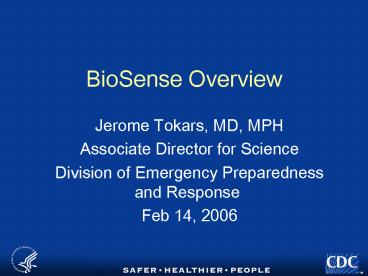BioSense Overview - PowerPoint PPT Presentation
1 / 24
Title:
BioSense Overview
Description:
RSV Codes by Week, BioSense, July 04-Dec 05. TM. TM. TM. Present: BioSenseRT ... RSV. Upper respiratory infections. Hemoptysis. Rash. Rash. Severe Illness and ... – PowerPoint PPT presentation
Number of Views:62
Avg rating:3.0/5.0
Title: BioSense Overview
1
BioSense Overview
- Jerome Tokars, MD, MPH
- Associate Director for Science
- Division of Emergency Preparedness and Response
- Feb 14, 2006
2
BioSense Overview
- Past
- BioSense system
- Special analyses
- Present
- BioSenseRT
- Future
- Some priorities for 2006
3
Past (and Current)
- Department of Defense (DOD) outpatient Medical
Treatment Facilities (n355) - ICD-9 CM diagnosis codes
- CPT procedure codes
- Veterans Affairs (VA) outpatient medical centers
and clinics (n849) - ICD-9 CM diagnosis codes
- CPT procedure codes
- LabCorp
- Preliminary diagnoses (ICD-9 CM)
- Test orders
- BioWatch negative test results
4
Codes Mapped to 11 Syndromes
- Botulism-like
- Fever
- Gastrointestinal
- Hemorrhagic illness
- Localized cutaneous lesion
- Lymphadenitis
- Neurological
- Rash
- Respiratory
- Severe illness/death
- Specific infection
5
Analytic Home Page
6
BioIntelligence Center (BIC)
- Initiated June 2004
- Dedicated monitors (personnel)
- Examine BioSense application for data anomalies
- Support for state and local personnel
- System troubleshooting and enhancement
7
Spectrum of Uses for Electronic Data
- Syndromes
- Diagnoses of specific diseases
- Influenza
- RSV
- Injuries
- Viral meningitis
- West Nile Virus
- Laboratory/radiology results
8
Numbers of Events, Standard vs BioSense
Influenza Surveillance
2003-2004
2004-2005
Sentinel Physician reports
9
RSV Codes by Week, BioSense, July 04-Dec 05
10
Present BioSenseRT
- An initiative within the BioSense Project that
emphasizes acquisition of clinically rich data in
real time from hospitals in major US cities - Data transmitted within 15 min of appearance in
HIS - Data visualized within 2 hours of receipt
11
BioSenseRT Functions
- Early Event Detection
- Early detection of disease prodromes
- Notification
- The early upswing of the epi curve
- Situational Awareness
- Information to manage an event
- Description
- All phases of the epi curve
12
BioSenseRT Patient Populations
- Emergency Department
- Hospital Inpatient
- Ambulatory Care
13
BioSenseRT Data Types
- Hospital level data
- Daily census (resources and bed utilization)
- Patient level data
- Chief complaint and diagnosis
- Patient demographics (obvious identifiers
removed) - ED data vital signs, etc
- Micro lab orders and results
- Radiology orders and results
- Pharmacy orders
Phase 1
14
Cities with BioSense Hospitals 2005 Commitments
- Atlanta, GA
- Baltimore, MD
- Boston, MA
- Chicago, IL
- Columbus, OH
- Dallas, TX
- Denver, CO
- El Paso, TX
- Indianapolis, IN
- Las Vegas, NV
- Los Angeles, CA
- Miami, FL
- Milwaukee, WI
- Philadelphia, PA
- Phoenix, AZ
- Portland, OR
- San Diego, CA
- St. Louis, MO
- Washington D.C.
Currently receiving data from 32 hospitals in 10
cities
15
Data Analyses and PresentationChief Complaint
and Diagnosis
- 11 standard syndromes
- 79 standard groups based on chief complaints and
diagnoses - Primary unit of analysis is the facility (ie
hospital) - Later analysis by county and/or zip code
16
Diagnosis Groups (n79)
- Botulism-like
- Paralysis
- Speech disturbance
- Dysphagia
- Fever
- Fever
- Septicemia and bacteremia
- Viral infection, unspecified
- GI
- Abdominal pain
- Anorexia
- Diarrhea
- Food poisoning
- Intestinal infections, ill-defined
- Nausea and vomiting
17
Diagnosis Groups
- Hemorrhagic
- Coagulation defects
- Gastrointestinal hemorrhage
- Hemorrhage
- Purpura and petechia
- Cutaneous lesion
- Insect bites
- Skin infection
- Lymphadenitis
- Lymphadenopathy
- Neurological
- Alteration of consciousness
- CNS, inflammatory disease
- Convulsions
- Gait abnormality
- Headache
- Meningismus
- Photophobia
18
Diagnosis Groups
- Respiratory
- Asthma
- Bronchitis and bronchiolitis
- Chest pain
- Cough
- Cyanosis and hypoxemia
- Dyspnea
- Influenza-like illness
- Otitis media
- Pleurisy
- Pneumonia and lung abscess
- Respiratory (continued)
- Respiratory failure
- RSV
- Upper respiratory infections
- Hemoptysis
- Rash
- Rash
- Severe Illness and Death
- Coma
- Death
- Shock
19
Diagnosis GroupsNot Classified Into Syndromes
- Allergy
- Anemia
- Bites, animal
- Burns
- Carbon monoxide poisoning
- Cardiac dysrhythmias
- Cerebrovascular disease
- COPD
- Dehydration
- Diabetes mellitus
- Dizziness
- Edema
- Falls
- Fractures and dislocation
- Heart disease, ischemic
- Heat, excessive
- Hypertension
- Hypotension
- Injury, NOS
- Jaundice
- Malaise and fatigue
- Mental disorders
- Migraine
- Motor vehicle traffic accidents
- Myalgia
- Neoplasms
- Numbness
- Open wound
- Poisoning by medicines
- Pregnancy, childbirth complications
- Sprains and strains
- Syncope and collapse
- Urinary tract infection
- Visual impairment
20
(No Transcript)
21
BioSense FutureSome Priorities for 2006 (and
beyond)
- Additional data sources and types
- Revised data analysis strategy
- Monitoring and reporting protocols
- Enhance BioSenseRT application
- Evaluate current application views
- Influenza
- Evaluations
22
Additional data sources and types
- Microbiology
- BT agents
- Reportable diseases
- Other organisms of interest
- Routine cultures and susceptibility
- Radiology
- CXR infiltrate, pneumonia
- Extremity fracture, dislocation
- ED-specific data fever, acuity
- Pharmacy
- Poison Control Center data
- Commercial laboratories
- Claims clearinghouse
BioSenseRT
23
Evaluation
- Early
- Accuracy of data and application
- Comments from users
- Middle
- Can we detect influenza?
- Can we see known localized outbreaks?
- Data useful in an emergency?
- Later
- Is there value added?
24
Themes
- Richer data
- Real-time data
- More specific events
- Situational awareness as well as early event
detection































